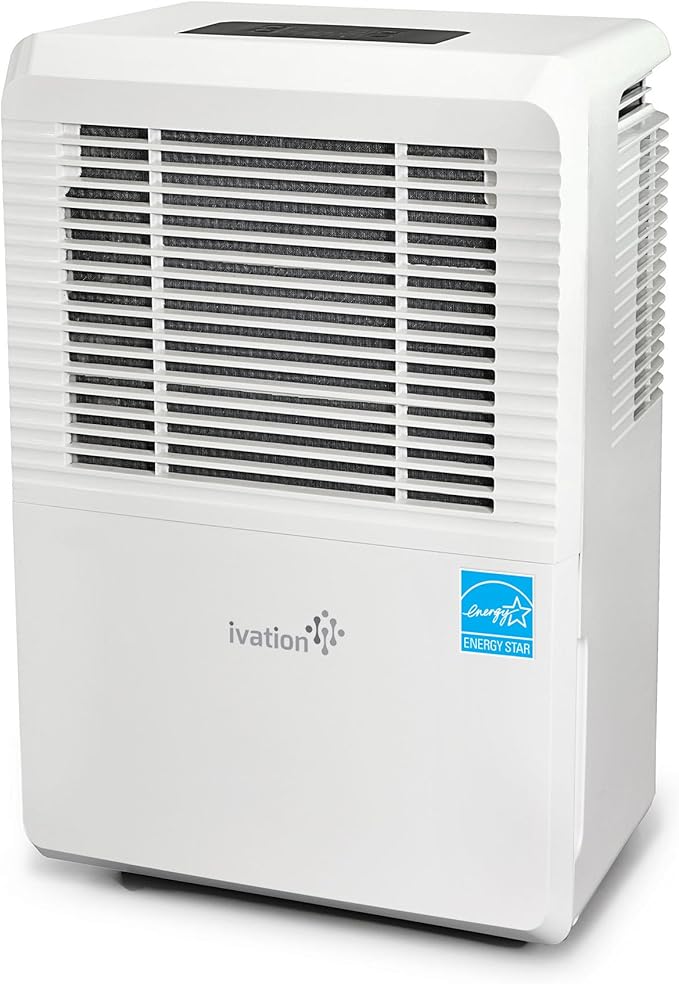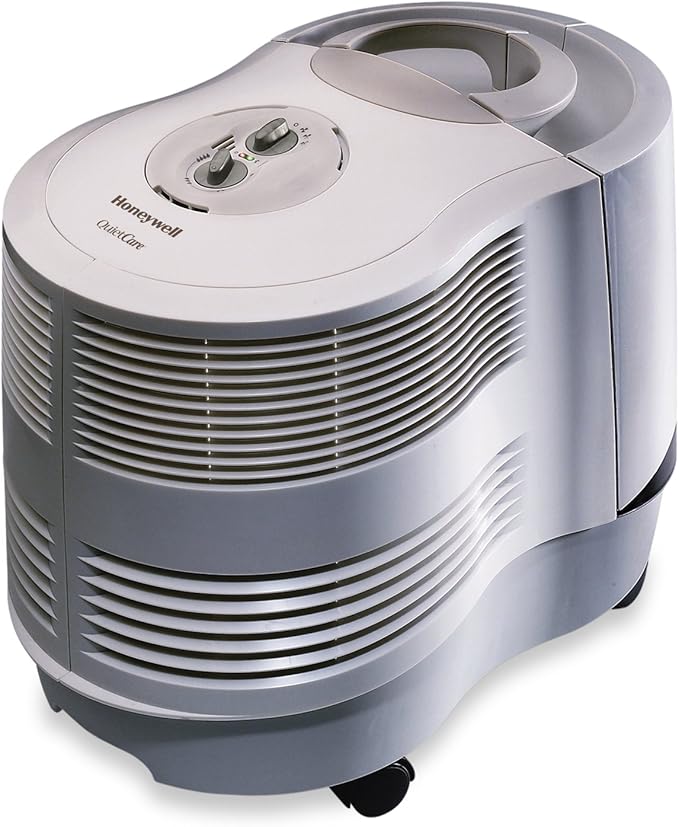Introduction
Humidifiers and Dehumidifiers determine your indoor atmosphere at your home in connection to how moist or dry it feels. A Dehumidifier operates by eliminating humidity from the air if your home is very humid. The opposite is the fact when it comes to Humidifiers as they emit water vapor into your home when the air is too much dry.
A Humidifier adds moistness to air when it’s extremely dry, i.e. below 35% moisture and a Dehumidifier takes out the moisture from the air when it’s too much humid, i.e. above 50% of the moisture. Just like the air ionizers which intakes the air and cleans all the harmful elements from it.
An ideal level of humidity for the typical home is between 35% and 45%. Maintaining the humidity level of your home within this range certifies the freshest, cool and healthy atmosphere, while also keeping your home from the loss resulted from extreme dryness or humidity. Air conditioning can also cause dryness in your home and cause health issues.
To look out what are the requirements of your home, you can verify the humidity level of your air with a virtual humidity reader, known as a Hygrometer.
Here are some of the facts and figures about the various applications of these essential internal well-being systems and how they function
Humidifier
It is usual for your air to be very dry during the winter or autumn season. This low degree of humidity can result in health issues like allergy flair-ups, nosebleeds, headaches, and dry skin. Here is the read we have written about the best holmes humidifier you should read to have a better understanding.
Low humidity can also trigger woodworking or wood furniture to dry out and blow. Humidifiers help to put humidity back into the air to evade these problems and maintain your air lanes perfectly.
It’s comfortable for mold and mildew to develop in these machines, so purifying them out after each use is suggested.
Humidifier becomes counterproductive if you’re adding humidity that’s occupied with mold, germs, and bacteria as you tend to become ill instead of staying fit and healthy. Following are some of the top features of Humidifier:
- Raises moisture in the air.
- Frequently used during the winter season when the air is dry.
- Keeps skin from drying out
- Helps to control allergies and nasal congestion.
Types of Humidifiers
There are two major kinds of Humidifiers, i.e. Warm Mist Humidifier and Cool Mist Humidifier. Each type operates in a bit different way. Warm Mist Humidifiers (or steam) operates by boiling water, which emits steam into the air. Cool Mist Humidifiers, on the contrary, discharge a cool vapor into the air. It uses a fan or revolving disc to vaporize the water and bring it out into the air.
Humidifiers have to be washed frequently to evade any mold or mildew development. It’s vital to use purified water and dump any excess water out of the basin when you’re finished using it.
Dehumidifier
In areas of extremely hot and tropical climate, you may observe that you need a Dehumidifier more frequently than a Humidifier. Dehumidifiers take the humidity out of your air which helps to keep dust mites, mildew, and mold growing in your home. If the air is excessively moist, many people come across several problems in terms of allergies and asthma.
Some of the top features of Dehumidifier include the following:
- Reduces the humidity in the air.
- Usually used during the summer season when the air is warm and moist.
- Keeps allergies and headaches at haven by averting mold and mildew development.
Types of Dehumidifiers
The various sorts of Dehumidifiers comprise of Refrigerate, Desiccant, Ionic Membrane, and Electronic. Below is a brief detail of how each of these Dehumidifiers functions.
- Refrigerate
- Electronic
- Desiccant
- Ionic
Refrigerate/Mechanical
This sort of Dehumidifier has a fan that pulls wet air into the unit and over a cooling coil. The coil contacts and removes the water from the air, dehumidifying it, and discharging the dry air back into the room. A refrigerated dehumidifier is the most common kind of Dehumidifier.
Desiccant
A Desiccant is an exclusive moisture-absorbing substantial that pulls wetness out of the air by spinning it through the system. Heat is typically used to draw the humidity out of the Desiccant.
Ionic Membrane
This sort of Dehumidifier uses a method called Electrolysis to eradicate water vapor so there’s no noticeable water and the Dehumidifier needs little or no maintenance.
Electronic
An Electronic Dehumidifier uses a heat propel to take out water vapor from the air using the process of Condensation. Though this sort of Dehumidifier is very noiseless, it is not very effective.
4 Best Humidifiers and Dehumidifiers
| Product Image | Product Name | Product Price |
|---|---|---|
  | 1. TOSOT 4,500 Sq Ft Energy Star Dehumidifier
| Check price on amazon |
  | 2. Ivation 70 Pint Energy Star Dehumidifier
| Check price on amazon |
  | 3. Honeywell Large SqFt Design
| Check price on amazon |
  | 4. MIDEA MAD50C1ZWS Dehumidifier
| Check price on amazon |
Does your Home need Dehumidifiers?
An air conditioner is a common need in hot and tropical areas. When the heat waves hit, your Home it is like a cool cavity that saves you from the damp atmosphere.
When the heat and humidity get certainly rough though, sometimes even the A/C isn’t resilient enough to perform the task on its own. During such times, a Dehumidifier may come to mind.
Acceptable Indoor Humidity Levels
Humidity is the evaporated water that is present in the air. A range of 40% to 60% moisture is what makes the normal person most relaxed. When the range reaches above 60%, not only can one become painful, but the water vapor can do substantial destruction to your Home. A little moisture is adequate, but too much can be injurious.
It is comparatively simple to different ad signs of unnecessary moistness in your Home. These indications of humidity harm can be detached and prohibited through the application of a complete house Dehumidifier.
Situations When Dehumidifier Becomes Essential
If you are facing any of these problems, it is rather probable that your home needs a Dehumidifying System.
Mold
Black mold is very risky and dangerous to your health. Extra humidity makes the perfect situation for black mold to develop. Confined wetness is very popular in storage spaces like garages and basements.
Condensation
When there is extensive humidity in a room, condensation can form on windows or any internal kind of glass. It may look like a vapor or fog as well.
Musty Smells
These kinds of smells mainly happen in basements and storage regions. This is typically an indicator that there is the existence of mold. A Dehumidifier can help temporarily remedy the condition, but getting to the basis of the issue is significant.
Feeling Sick
Mold can result in critical health problems, from fatigue to severe disease. A Dehumidifier is essential if this is revealed to avoid further mold development. You will also need to find someone who can eliminate the current spores.
Humidifier vs Dehumidifier
The Humidifier operates by removing impurities of water from the adjacent air. It ejects intense dampness to make the living region less dry and therefore best for the inhabitants of the Home. You should have it in your Home if you are likely to experience a sore throat and other respiratory problems or dry skin. It will make the hot and dry weather more tolerable and calm and release you from your health issues.
Most models feature warm or cold conditioning settings which make them perfect for times when the cold night substitutes the hot day. The best thing about them is that you can leave them always on and they need only unexpected repairs and maintenance that is simple to attain on your own.
Dehumidifiers eliminate water from the room and use dry and recycled air to reduce the absolute Humidity in a room. It doesn’t eradicate every individual hint of water particles; it only lessens the level to more appropriate situations that are easy. Staying in extremely wet areas mainly give rise to several health issues such as asthma, allergies, and lung problems.
Mold grows in humid atmospheres, and it can simply pollute the living spaces and spread without the owners ever observing it. It can impact your inhalation and result in illness, so if you face the initial signs of this, be certain to visit your doctor and get a Dehumidifier as soon as possible. These instruments are almost completely maintenance-free, which makes Dehumidifiers perfect “set and forget” daily home-based appliances. If you are still confused between Air Purifier Vs. Humidifier we have written another guide which helps pick the right device for your indoor house.
How Does Humidity Affect My Health?
Both of these equipment works to help lower diseases like chest congestion, allergies, lung issues, and asthma. On one other side, using a Dehumidifier could help treat asthma that is caused by wet air. If you are facing a cold that has resulted in adenoidal way obstruction or just chest and sinus congestion, using a Humidifier will help break that up. By rising the water content of the air, nasal passages and airways become moisturized, decreasing uneasiness.
How Does Humidity Affect My Home?
The feel of the rooms can also be used to choose between the two you would require for your Home. If your eyes are becoming irritated, your skin and lips are getting dry. Then you should need a Humidifier. On the other hand, if there are moist marks on the ceilings or walls or if rooms are airless because of decomposing wood, then you should need a Dehumidifier.
Dry air in the house can result, over an extended period, cracks on wooden beams, some kinds of plasters, and leather furniture. The dry air can split wooden tools like guitars and violins in the house. In this situation, a Humidifier would help effectively. Mold can also expand on walls and ceilings if there is a lot of Humidity in the house. This could cause health issues. A Dehumidifier evades this from occurring and can also solve the problem.
Considering a Dehumidifier
Making sure the quality of air in your home is not just essential for your ease but also for your health. A moist home can give rise to several allergens. Mold, mildew, and dust mites grow in humid areas. Humidity can also infuriate the indicators of allergy and asthma and result in the loss of your home.
If you are feeling sweaty, even when the air is on, maybe you should think of a complete house Dehumidifier.
Signs of an Extra Humid House
It can be simple to overlook the indicators of a highly humid home. Several people do this to evade paying the upfront costs linked with dehumidifying a home. Though, the costs that come with lasting high humidity can far exceed the cost of a Dehumidifier.
Here are some of the widely seen signs representing that your home might need a Dehumidifier:
- Condensation on Windows
- Water Tints on Walls
- Odors Related to Excessive Humidity
- Worst Ventilation
- Mold Spots
Choosing a Dehumidifier
If the signs mentioned above of increased moisture in your home show that you require a Dehumidifier, you have numerous choices. Some homes only need a small Dehumidifier made explicitly to control the humidity of a single room or a small flat. However, if the levels of humidity influence more than one room in your home, the entire house Dehumidifier is a perfect choice.
The average cost of a house Dehumidifier is between $900 and $1,200, whereas single room Humidifiers range from $200-$300. Although the starting price might make homeowners quail, there are advantages to the house Dehumidifier. For instance, purchasing a bigger and more talented unit means using less power consumption. Small Dehumidifiers often operate continuously, while house Dehumidifiers can work irregularly through the day. If you’re searching for long-standing investments, the house Dehumidifier is the perfect alternative.
Another advantage of the house Dehumidifier is that you don’t have to drain THE water from the system continuously. Small Dehumidifiers require you to empty the water from the unit more regularly to make sure it stays hygienic and operates competently.
Installing a House Dehumidifier
Fixing a house Dehumidifier can be a complex DIY project. To assure the efficiency of your Dehumidifier, it’s suggested to have a house Dehumidifier fixed by a skilled HVAC service professional. This gives you to relax knowing that your new Dehumidification system will work proficiently to eliminate humidity from your home.
If you think you might need a Dehumidifier but are still on edge about purchasing one, get a second alternative from a reliable HVAC company. An immediate home examination team may help you find a simple answer to lessening your home’s moisture. In some situations getting your ductwork accurately closed is all you require to decrease the moisture in your home.
5 Best Small Humidifier and Dehumidifier
| Product Image | Product Name | Product Price |
|---|---|---|
  | 1. Honeywell Cool Moisture Console Humidifier
| Check price on amazon |
  | 2. LEVOIT Ultrasonic Air Humidifier
| Check price on amazon |
  | 3. AUZKIN Small Dehumidifier
| Check price on amazon |
  | 4. SEAVON Electric Upgraded Dehumidifier
| Check price on amazon |
  | 5. Pure Enrichment MistAire Ultrasonic Cool Mist Humidifier
| Check price on amazon |
How Does Weather Affect Indoor Humidity?
During the summer season, the air is certainly moister. It would then get tacky and tight inside the house. Dehumidifiers should be used in that situation. When the winter season arrives though, the air is typically dry and cold. Heaters make the case more complex by eliminating most of the moisture in the house and thus making it extremely dry. Humidifiers are best used in this aspect.
Pest control can be affected by managing and controlling the moisture in the house. Carpenter ants, wood destroying beetles, and termites are enticed by humidity. This results in a lot of destruction and will prove expensive to repair and maintain. Using Dehumidifiers to decrease the water content in the air could determine these pests away.
If you have conserved plants in your home, it is necessary to detect the dampness. Drier air means you would need to water your house plants more since they emerge more. However, extremely humid air makes it simpler for these plants to become septic from these illnesses. A Dehumidifier and Humidifier should be consequently selected.
Final Verdict
Individual health must be the deepest concern for anyone who occurs to reside in parts of the world where the weather reaches extreme temperatures. It doesn’t matter if you inhabit areas where the intense sun or cold temperatures control the atmosphere; you can stabilize out your home space and make it more pleasing no matter what the external weather situations are. There are different products like Ozone Air Purifier, Ionizer, and humidifier which help you clean your indoor air.
Most of the time, getting both a Humidifier and its opposite, the Dehumidifier is also a must to avert severe health problems from raising their unpleasant heads. Hence we feel that these extremely pioneering and valuable devices deserve their position in every home because of their beneficial functionality and general quality of life enhancement aspects.
Frequently Asked Questions
Do Babies Need a Humidifier or Dehumidifier?
Of course yes, parents want to keep their kids warm and save them from cold. Yet, this can be difficult for a baby since the air in the home can become dry more often.
Dry air can make the individual’s nose, mouth, lungs, and eyes dry out. A baby Humidifier adds wetness in the air so that your baby will not undergo the effects of dry, hot air.
How Do I Know if I Need a Humidifier?
After waking up with Congestion is one of the common symptoms that you may require a Humidifier. Apart from this, the following are the basic indicators that tell the need for Humidifier:
- Having Dry Skin and Broken Lips
- Suffering From Morning or Night-time Congestion
- Getting Nosebleeds
Can I Leave Dehumidifier on All Night?
Having your Dehumidifier working all night is harmless and also the best hint if the relative levels of humidity are high. High levels of humidity can influence your sleep in three basic ways, referred to as inhalation, ease, and allergies.
Does Humidifier Help With Congestion?
Adding moisture to the air with the help of a cool-mist Humidifier will give more humidity inside your nose. Your nose is thought to purify the air that passes through it, so if the air is dry outside, the air will be dry inside your nose as well. The damp-filled air that a cool-mist humidifier releases are best for your sinus it is, particularly in the colder seasons.







